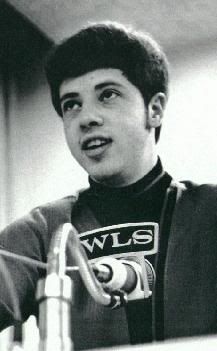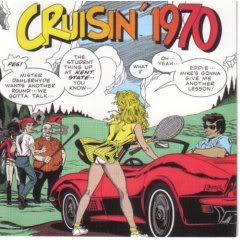
You know Kris Erik Stevens. Or you should.
Stevens started as a disc jockey in the Upper Peninsula, became a stalwart in national rock 'n' roll radio and blossomed into one of the most recognizable voices in broadcasting today.
As a kid, Stevens palled around with Jim DeCaire (mastermind of Da Yoopers) and graduated from Ishpeming High School in 1962.
He immediately found employment at local radio station WJPD. Following opportunity, Stevens moved on to WLTH in Gary, IN the following year.
By 1966, he landed his first large market job at KOIL in Omaha, where he worked under the name "Johnny Mitchell." Then, in successive years, he moved through stations in Windsor (CKLW, where he was known as Billy Mack); Pittsburgh (KQV); and Atlanta (WQXI).
Rock music powerhouse WLS (890 on your AM dial) lured Stevens to Chicago on Valentines Day, 1968. The 50,000 watt giant broadcast to the entire mid-section of the country, including the Upper Peninsula and Escanaba.
Maintaining a quaint teenage custom, local kids took to their cars in the evenings to catch the latest sounds from WLS, as well as broadcasts on rival WCFL (AM 1000). From Oct. 1970 until the end of the following year, Stevens' three hour show began at 6 p. m. Most listeners were probably unaware of the DJ's U. P. roots.
A sampling of Stevens' program is preserved on "Cruisin' 1970," a yearly volume in a series documenting rock 'n' roll radio, issued by Increase Records, a Chess subsidiary. Beginning with 1955, the 18 disc set features distinctive cartoon covers drawn by Mike Royer, telling the continuing story of characters "Eddie" and "Peg."
The aim of the series is to re-create a top DJ's original program, including songs of the spotlighted year as well as commercials, news, sports and weather bits, plus station jingles.
Stevens' time capsule was produced by Frank Slay, a songwriter and music publisher, who supervised the recording of Sugarloaf's "Green Eyed Lady." A number three hit from August of that year, the song is one of 11 surveyed on the collection.
Other memory-inducing tracks on the album, issued in 1995, include: "Spirit in the Sky," Norman Greenbaum; "Gypsy Woman," Brian Hyland; "Vehicle," Ides of March; "One Less Bell to Answer," Fifth Dimension; and "Sunshine," Jonathan Edwards.
Stevens even plays a "WLS number one oldie" in "Will You Still Love Me Tomorrow," by the Shirelles, from 1960. Just like real radio, the hits are interspersed with ads for Coke, Eastern Airlines, Sears (hey, they're having a record sale), Pepperidge Farms and Chicago Today.
In 1972, Stevens, armed with a Billboard magazine on-air personality award, switched allegiance to competitor WCFL. Some listeners probably followed Stevens to his new job, but most kids in the northern hinterlands listened to both stations anyway.
After three more years in the Windy City, Stevens decided the sunny climes of California were calling him and took a position at KIIS in Los Angeles.
While in California, he started Kris Erik Stevens Enterprises, a broadcast creative services company, parlaying his talent to remarkable success.
You'll recognize his impressive vocal abilities in television promos for HBO, ABC, CBS, NBC and Fox; commercials for McDonald's, Levi's, Ponderosa, Wall Street Journal and dozens more. He's done voice-overs for every major motion picture studio as well being the voice of dozens of TV and radio stations. The radio veteran may be most readily identified as the host of "Movie Tunes," a music network heard in 20,000 theaters around the world.
Today Stevens resides in Calabasas, CA, where his studio is located, but his voice continues to be heard virtually everywhere.
Now, you really know Kris Erik Stevens, former Upper Peninsula disc jockey.


 I've enjoyed rock music and writing since I was a teenager in the 60s. I feel lucky to have been around when rock's greatest stars created their most enduring hits. At the same time I found I enjoyed writing, as well. I worked on my high school newspaper and magazine, was editor of several college publications and earned a bachelor's degree from Central Michigan University in 1973. I worked for the daily newspaper in my hometown after graduating, becoming managing editor after a few years. By the 1980s, I moved into public relations. In 1985, my wife Sue and I opened a retail music store, The Record Rack, which we still own. Rock 'n' roll has been integral to me and for the last 2O years I've been earning my living from it even though I don't have a musical bone in my body. In recent years, I've also I edited a small local magazine and launched a micro FM radio station. Now, I'm finally combining my love of writing and rock 'n' roll. I can't sing a note, but I know what I like. I'll tell you all about it when you read on. I hope you have as much enjoyment reading these installments as I've had writing them.
I've enjoyed rock music and writing since I was a teenager in the 60s. I feel lucky to have been around when rock's greatest stars created their most enduring hits. At the same time I found I enjoyed writing, as well. I worked on my high school newspaper and magazine, was editor of several college publications and earned a bachelor's degree from Central Michigan University in 1973. I worked for the daily newspaper in my hometown after graduating, becoming managing editor after a few years. By the 1980s, I moved into public relations. In 1985, my wife Sue and I opened a retail music store, The Record Rack, which we still own. Rock 'n' roll has been integral to me and for the last 2O years I've been earning my living from it even though I don't have a musical bone in my body. In recent years, I've also I edited a small local magazine and launched a micro FM radio station. Now, I'm finally combining my love of writing and rock 'n' roll. I can't sing a note, but I know what I like. I'll tell you all about it when you read on. I hope you have as much enjoyment reading these installments as I've had writing them.


No comments:
Post a Comment